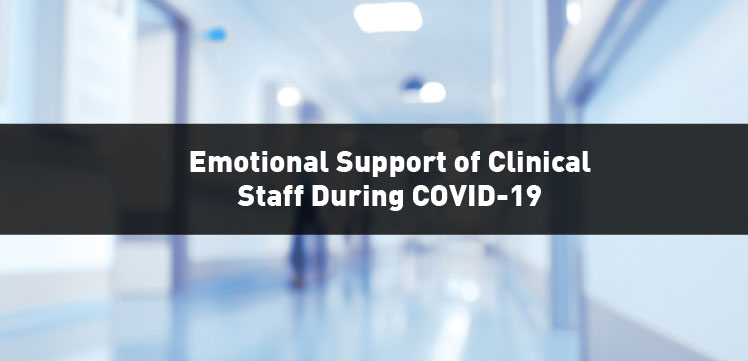 COVID-19 has changed the way every American, as well as the entire world, thinks. Some say we have a “new norm” and it is going to take new strategies to face the unique challenges evolving every day. Along those lines, it is essential to look with fresh eyes at those who are not only dealing with their own safety, but those who are the first responders and are on the front lines caring for others.
COVID-19 has changed the way every American, as well as the entire world, thinks. Some say we have a “new norm” and it is going to take new strategies to face the unique challenges evolving every day. Along those lines, it is essential to look with fresh eyes at those who are not only dealing with their own safety, but those who are the first responders and are on the front lines caring for others.
Healthcare workers are not immune to the emotional aspect of the critical roles that they play and will continue to play going forward during the pandemic recovery process. These caregivers are not resistant to the myriad of emotions being experienced by patients and families alike. They are exposed to and experience the same emotions, such as feelings of grief, anxiety, sadness, stress, hope, being overwhelmed, and pure gratitude. As leaders in healthcare, we have a responsibility to support these frontline heroes, not only with Personal Protective Equipment (PPE) for their physical safety but also for their psychological well-being.
Six tips for supporting our front-line heroes:
-
Don’t underestimate the power of saying “Thank You” - Gratitude goes a long way. Handwritten notes given to the arriving and departing staff is an excellent way to encourage camaraderie and provide a morale boost at the beginning or end of a shift. Yes, care provision is key part of the job…but acknowledging their commitment and kindness may often mean more than other factors or affirmations.
-
Breaks and a safe place to decompress - While resting may seem like a tall order in the light of the heavy demands being placed on healthcare workers; the reality is that even 5-10 minutes in a quiet place to regain stamina and equilibrium may give healthcare workers the balance to get through a difficult assignment, a critical patient or challenging circumstance. It’s a way to “reset or refresh” both mentally and physically and might be what is needed to allow for a quick recharge.
-
Entertainment In the lounges - by providing entertainment such as inspirational videos, appreciative messages, funny animal videos, etc. during breaks might help lighten the mood. In the short of it, it can cause a few minutes of distraction and the chance to think about something lighthearted or even nothing at all!
-
Nourishment - Provide healthy snacks, fresh fruit, packets of nuts, yogurt, even a bit of chocolate that can provide a quick pick me up during breaks. Having a ready source of bottled water on hand for your staff can also help ensure they stay well hydrated. Remind your staff that part of prevention is keeping their own immunity up and attended to.
-
Open Communication - Schedule a set time during report that can be used for open communication for the healthcare team. Allowing time for staff to ask and answer questions along with creating opportunities to grieve, cry, and get angry is all helpful and healthy. Validating their emotions as real and normal is so important. Allow for space—which may be the way some cope—all without judgment.
-
Show Appreciation - Provide staff encouragement. Give them praise and recognition for a job well done. Showcase the heartfelt thanks being provided by families, residents and even local and national messages of encouragement and appreciation. Recognition of the heroic measures they are taking in the face of personal risk will go a long way in maintaining staff morale.
We’re in this together!
Lastly, through it all, be sure to verbalize consistently that millions of people in America stand behind every staff member and appreciate them for all their efforts. That it takes more than clinical expertise. It takes those things that often times propelled people into healthcare in the first place—courage, bravery, compassion and personal sacrifice—to be able to do what they are willing to do during this trying time and it does not go unnoticed.

Greg Seiple, RN is the VP of Clinical Informatics at SHP with over 25 years’ experience in Clinical Services and Operations on the Skilled Nursing side having served at a Vice President or Senior Vice President of Clinical Services for several long term care companies during his career. Greg is also an adjunct instructor for Penn States Nursing Home Administrators course taught at the main campus in State College, PA.
